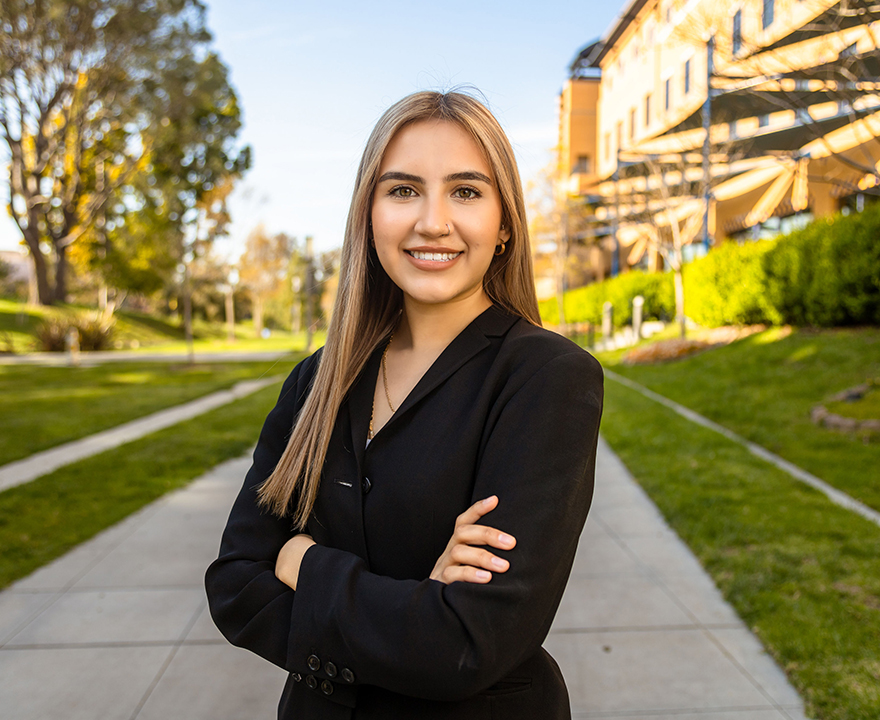Future lawyer

Future lawyer
- June 6, 2024
- Double majors in sociology and criminology have prepared Yamileth Partida Reyes well for a career in law
Yamileth Partida Reyes applied to UCI with sociology already in mind. The course offerings did not disappoint.
"I came in with sociology, and I stuck with it because I found the courses that UCI offered really interesting. I've been able to take a lot of classes on immigration, family relationships, death, marriage, gender, sexuality," she said. "It's all just really interesting. So I've never been bored with my major."
In particular, the fourth-year undergrad has loved the classes she took with Sabrina Strings, who is now a professor and North Hall Chair of Black Studies at UC Santa Barbara. "I think that's when I really started to love my major," she said. "The way she conducts her classes and the way she teaches, it was really impactful."
Partida Reyes soon realized that her sociology degree would not take a full four years to complete. To her, that was a problem because she was eager to maximize her time on campus, which had already been limited by pandemic restrictions. "That was really important to me," she said. "I just really wanted to get more involved on campus, build my resume, get an internship with an attorney, serve on boards of different organizations on campus. And I felt like if I graduated in three years, I wouldn't have the opportunity to do those things."
So she decided to add a second major during her second year. Already on a pre-law path, she was keen to study something more directly related to law. She chose criminology and joined a pre-law fraternity on campus called Phi Alpha Delta, where she now serves on the internal board and advises incoming students on things like resume building and preparing for interviews.
She’s also the director of communications for an organization called Students Advocating for Immigrant Rights and Equity, or SAFIRE, and interns on campus with UC Immigrant Legal Services, which offers aid to undergrads and graduate students who need assistance with immigration-related issues. "Since UCI is one of the UCs with the most undocumented students on campus, we serve a big population," she said.
UCI makes many resources available to students from immigrant families, including the DREAM Center, an organization on campus that supports students who are impacted by immigration policies. It's part of what attracted Partida Reyes to UCI in the first place (in addition to Irvine's safety and ample scholarship opportunities). "I am part of a mixed-status family," she said, referring to a single family in which members have varying immigration statuses.
The DREAM Center's director, Angela Chuan-Ru, has been one of Partida Reyes’ many good mentors. "She's just been really incredible and really helpful. She really supports students, and she helped me get multiple internships, including the one that I'm at now with UC Immigrant Legal Services. And she's written great letters of recommendation and always takes the time to support me in anything I need."
Through her work on campus, Partida Reyes has also networked with students who she will be interviewing for her senior honors thesis, conducted under Rocío Rosales, associate professor of sociology. For her paper, Partida Reyes is looking at relationship dynamics between undocumented and U.S.-citizen siblings.
"The undocumented siblings would be considered the 1.5 generation of immigrants, because they're technically from another country, but they were raised here," she said. "And so they grew up basically in K-12 education, and they had the same sort of upbringing and everything. But as they reach adulthood, they have different life trajectories — depending on their status — if they're not able to get a driver's license or hold employment, access higher education and things that their siblings might be able to do."
Even when raised by the same parents, in the same household, these differences can affect the ways in which undocumented individuals interact with their siblings.
"Since it's so personal to me, I feel like I already have a lot of background on it," she said. But she's been surprised by how little research there is on the subject, considering that policies like DACA and the DREAM act are such hot-button political issues.
"A lot of times, the existing literature looks at how parents' immigration statuses impacts their U.S.-citizen children, but it doesn't really take into account an older sibling who may have been born in another country versus a younger sibling, and things like that."
Partida Reyes' future will see her return home to California's Central Valley. After graduating in June this year, she will move back to Fresno and hopefully find an internship in the legal field before applying to law school for a fall 2025 start. Then she aims to settle in Fresno for good.
"One of my goals is to open my own firm in Fresno, have a small practice," she said. "There's a lot of agriculture in the Central Valley, meaning a lot of farm workers who might need support if they have experienced wage theft or exploitation. And since I do speak Spanish, and I do speak English, I feel like I could serve this population. And labor and employment law is something that's really interested me."
The community there will be lucky to have her.
-Alison Van Houten for UCI Social Sciences
-----
Would you like to get more involved with the social sciences? Email us at communications@socsci.uci.edu to connect.
Share on:


